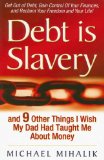Debt is Slavery: and 9 Other Things I Wish My Dad Had Taught Me About Money, by Michael Mihalik. This book is short, to the point, and packed with lots of great advice. I’ve read it three times and I would put this in my top five personal finance books, possibly at number one. I think for someone just getting started with figuring out their debt and finances this is probably the first book to read. It’s short enough to get through very quickly and find some immediate advice and inspiration to get your finances under control.
The book offers this definition of slavery: “The state of being bound in servitude as an instrument of labor” [pg. 23]. Do you ever wake up in the morning and not want to go to work that day? Do you go anyway? Do you go because you really love your job that much or do you go because you owe money to someone (probably many people) and even though you may have a choice of how you’ll earn your money, ultimately you have no choice but to go to work and get that money. Lately, I’ve been dreading Monday mornings as early as Saturday night. I feel trapped and bound to this service by my debts.
“Too many people hate their jobs but are afraid to leave, because they wouldn’t be able to pay their mortgage, credit card bills, car loans, or boat loans. Debt can turn a free, happy person into a bitter human being. Debt can turn you into a slave.” [pg 25].
It’s possible for debt to be good, but debt is still slavery. A mortgage can usually be thought of as good debt, but you still must make sure you can afford the mortgage you are signing up for.
“The word ‘mortgage’ is derived from the Latin word ‘mort,’ which means ‘death’, and the Germanic word ‘gage’, which means ‘pledge’. So ‘mortgage’ means ‘death pledge’. What does that tell you?” [pg 30]
When we spend money, we are really trading our time for the things we buy. We make this even worse when we go into debt to buy things. We are now committing our time in the future to work to earn money to pay for the things we bought in the past. This becomes even more painful if you don’t like your job.
‘Stuff’ ads busywork and stress to our lives. So much stuff we buy we don’t even need. Eliminating unwanted stuff from our lives is an important part of getting control of our finances and getting out of debt.
Experiences are more valuable than stuff. Don’t find happiness only in buying things. You won’t look back on your life when you’re older and fondly remember the stuff you accumulated.
It will be easier to stop buying stuff if we avoid advertising and understand that we are constantly being marketed to and a lot of money is being spent to convince us to buy things.
Make a goal of saving 50% of your income. If you do this, you would have the ability to take a month off from work for every month you work (assuming you’re earning an income from a job and not passive sources). Don’t spend more money when you get a raise. If you keep your expenses the same as before, you can increase your savings exponentially, even as your income may not be increasing at such a high rate.
Money doesn’t buy happiness, it buys freedom. This is my greatest motivator for making more money and getting out of debt right now. I want to be free again.
This book is packed with solid advice, expertly fit into a short, easy to read format. If you’re just getting started with fixing a financial mess in your life, I would buy this book immediately. If you need a little extra motivation and a better understanding of the mistakes of the ‘normal’ American way when it comes to money and work, read this book. I had planned to give away my copy after reading it, but I decided this is one I want to keep on my bookshelf so I have it available to read again when I see bad habits creeping back into my life.
